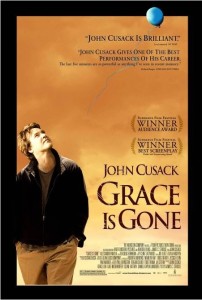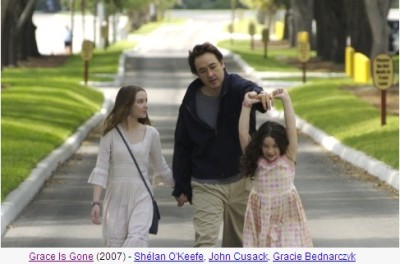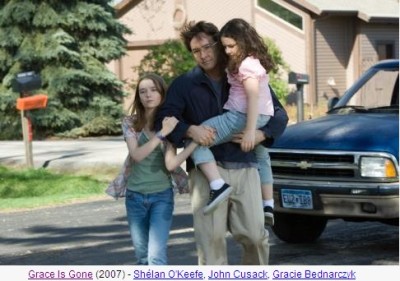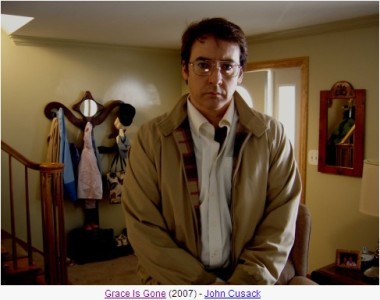By: debbie lynn elias

We are so accustomed to seeing John Cusack as a sensitive, confident, intelligent, sexy, amiable and very likeable “Lloyd Dobbleresque” character, that when he appears on screen as bespectacled, dowdy, hunched and gimpy home store manager Stanley Phillips, the first impression is shock, surprise and a fervent desire to learn who this man is and what his story is all about.
Stanley was a gung-ho military man. His belief in this country was so great that he would blindly serve, protect and defend without batting an eye or giving it a second thought. His belief and dedication ran so far, so that he “cheated” on his eye exam just so he could join the Army. Like Stanley, Grace wanted to serve our country. Meeting in boot camp, the two fell in love and married, intent on serving together. Unfortunately, Stanley’s deception caught up with him and while he was drummed out of the service, Grace moved up through the military ranks. Stanley moved through the ranks of a home improvement store. Along the way, they had two daughters, Heidi and Dawn. And then came Iraq.
Shipped out with her unit, Grace finds herself in the heat of battle and the Iraqi sun while Stanley finds himself in the heat of his own battle – trying to raise two little girls alone. Unable to communicate with them, he appears to find solace in his work. Huddling up like a squad before a game, Stanley shows glimpses of light and life and shadows of who he once was. At home, he is silent, rigid and unsure but running things with military timing and personal disconnection. Looking for any way possible to handle the rigors of life without Grace, he even attends a military wives support group and while the women are talkative and unabashed in their subject matter, Stanley sits alone with clenched fists and knees drawn intent on keeping private things private.
But then, Stanley must face what every military spouse fears. The knock on the door. In one still shocking moment, Stanley’s life and love, finishes crashing to the ground. Grace is gone. Shattered, Stanley is at a loss over how to tell Heidi and Dawn their mother is gone. Trying dinner out, sitting them down, he can’t find the words or the strength. And so, in the midst of complete panic and frustration, a moment of clarity seizes him. A road trip – anywhere they want to go – a spontaneous fun-filled road trip of dad and his girls. Dawn, always up for fun, knows right away where she wants to go – Enchanted Gardens – a beautiful haven of an amusement park in Florida with happy family memories. Heidi, grounded and cerebrally organic, is suspect and vehemently argues about school and homework.
Without even returning home for a change of clothes or a toothbrush, the trio set out on what will prove a life altering experience for them all.
Several weeks ago I reviewed John Cusack’s performance in “Martian Child.” I described it as his Oscar moment. Now, I may have to retract that statement or else confuse Academy voters further for after seeing him here as Stanley Phillips, Cusack turns in a poignant, intimate, emotionally complex and transformative role that is equally if not more worthy of Oscar gold. For the first time in his lengthy career, Cusack undergoes a physical transformation to the point of unrecognizability in the opening shot. With large square gold -rimmed glasses reminiscent of many military men I have known back in the 70’s and 80’s, unwrinkled Teflon coated khaki pants, “Members Only” style jacket with a clubbed foot limp and dejected hunching, Cusack is mesmerizing. With frustrated sincerity, you feel his anguish and his pain just by looking in Cusack’s eyes. Minimalistic body movements speak volumes as to Stanley’s character and his past. Written specifically for Cusack, I am impressed with writer/director James Strouse’s ability to capture and create a character this different from Cusack himself. I am even more touched and awed by Cusack’s performance.
An intimate story involving primarily the three Phillips family members, it was critical to cast actresses capable of conveying the intensity and emotion of the situation, but also to be sisterly and behave like 8 and 10 year olds. Enter newcomers, Shelan O’Keefe and Gracie Bednarczyk. Never having acted before, these two come across like experienced veterans – and sisters. Shelan is a young lady, wise and talented beyond her years and her own “old soul” permeates the level-headed Heidi as she matures from child to adult right before our eyes. Her talent is limitless and while I hope we see more of her on the screen, whatever path Shelan chooses in life will be the better because of her. Gracie is beyond delightful. She is perky, bouncy, full of life, giddy, silly. As Dawn, she is a little girl who likes to pick on her sister and has more fun on screen (and off as well) than anyone I have ever met. Make note of one her favorite scenes – jumping on a hotel bed, diving onto the floor and landing in a split – while giggling.
Adding a political counter balance is Alessandro Nivola as Stanley’s brother John. The complete opposite of Stanley, as John, Nivola provides an infectious enthusiasm that serves the characters and story well, particularly when interacting with the girls and trying to impress upon them the fallacies of unquestioning patriotism and blind faith.
Written by James Strouse who also makes his directorial debut here, the story is one that has long needed to be told and not only provides an unspoken perspective to the war, but puts faces and hearts to the emotional war at home and losses being suffered. The film is neither pro-war or anti-war but is balanced, staying on an even keel dealing with love and loss. Tender moments such as Stanley calling home just to hear his wife’s voice on the answering machine even though he knows she is gone will touch your heart. How many times has each of us done something like that in our lifetimes? And capturing the life’s breath of the girls is refreshing and uplifting. Noticeably absent though is a clear backstory on Stanley and while Cusack internally developed one in order to embody the character, I would have liked to have seen that fleshed out a bit more.
From a directorial standpoint, Strouse does an acceptable job. Using stationery shots for much of the film, he knows enough to expand his views and as the characters grow, develop and breathe, so does the Hi-Def camerawork. And while his framing may be off at times and some shots inappropriate, Strouse never loses the emotional impact and maturity of his story.
Heart-wrenching and poignant, simple and dignified, GRACE IS GONE gently speaks to the heart and soul while the world and war ravages around us.
Stanley Phillips – John Cusack Heidi Phillips – Shelan O’Keefe Dawn Phillips – Gracie Bednarczyk John Phillips – Alessandro Nivola
Written and directed by James Strouse. Rated PG-13. (85 min)












